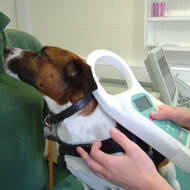Controversial new microchipping law announced

RCVS president Stuart Reid said the preliminary investigation and disciplinary committees would not consider these cases worth pursuing.
Under a new law introduced on 1 April this year, veterinary surgeons and nurses could face prosecution and a fine of £500 if they fail to report cases where a dog should have a microchip but it cannot be found.
News of the law raised eyebrows among delegates at BSAVA Congress last week, where it was discussed during a talk on legislation in the big issues stream.
The law only applies in England and covers identity chips implanted in dogs, but not other species that are routinely chipped.
Clinicians or members of the public who do not report that a device has been removed, malfunctioned or migrated from its expected position are committing an offence under this law.
Audience members at the congress believed the system to be unfair and unenforceable. It also raised the question of whether practitioners are expected to scan every dog presented in their consulting room and, moreover, what they should do if the owner refuses permission to carry our the procedure.
Delegates also questioned how they can readily check the animal's details when there is not one, but many databases holding the information.
Lord Sandy Trees, who was present at the talk, said he had advised the government against the idea, noting that evidence suggests it is extremely rare for microchips to move within the body, posing a risk to the animal's health.
Also present were the chief veterinary officers for two of the devolved administrations, who attended to hear the arguments against introducing similar rules in Scotland and Northern Ireland.
Dr Sally Everitt, BSAVA's head of scientific policy said she had received an explanatory email from Defra since the rule came into force. It stated that the government would not expect prosecutions to be carried out through the magistrates courts. Such cases would instead be dealt with by the RCVS disciplinary procedure.
Gordon Hockey, head of the RCVS' professional conduct department, said he felt it unlikely that the college would be dealing with a steady stream of cases:
“I don’t think vets were even on their radar when this legislation was drafted. It may just be one of things that raises concerns in the profession that nobody else is worried about."
RCVS president Stuart Reid said his colleagues on the preliminary investigation and disciplinary committees would not consider these cases worth pursuing: “It is unrealistic to believe that they would identify this a professional conduct matter."



 The veterinary mental health charity Vetlife is inviting the veterinary community to join it for a sponsored cold-water dip.
The veterinary mental health charity Vetlife is inviting the veterinary community to join it for a sponsored cold-water dip.